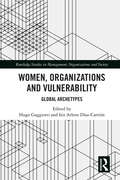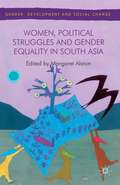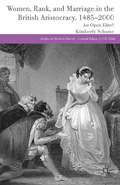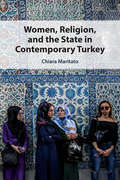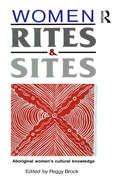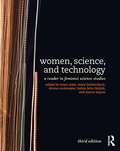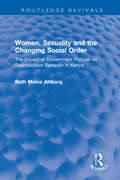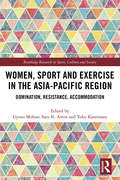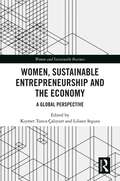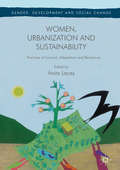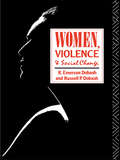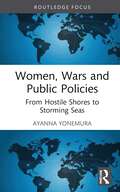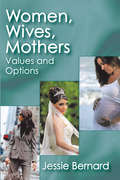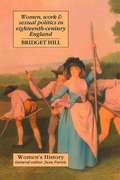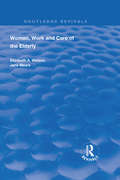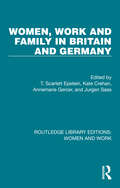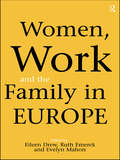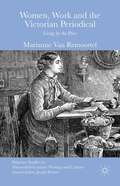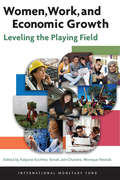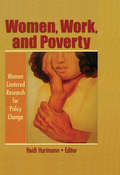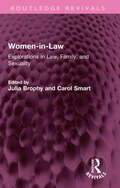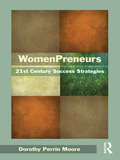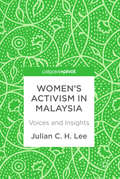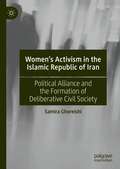- Table View
- List View
Women, Organizations and Vulnerability: Global Archetypes (Routledge Studies in Management, Organizations and Society)
by Isis Arlene Díaz-Carrión Hugo GaggiottiWhy are women, despite being resilient, adaptable, and persistent, often constructed and perceived as weak and vulnerable? Women’s vulnerability is not a neutral concept but is organizationally defined and understood. Organizations are discursive spaces where women’s vulnerability is constructed and reproduced as a communicative act and event. We often represent vulnerability at individual or organizational levels, but not both. Women’s vulnerability reminds us of the pervasive interconnectedness of personal and organizational life events. Experiencing women’s organizational vulnerability is common. However, is women’s vulnerability publicly represented, defined, felt and acted upon in the same way everywhere?This book is focused on comparing women’s organizational vulnerability practices making a significant contribution to reflection, theory, methods and cross-disciplinary expertise. The process of making sense of “vulnerability” is extremely diverse and intersectionally constructed through gender, culture and organizational discourses, which demands complex, innovative and non-Eurocentric methodological paradigms and approaches. This book satisfies these demands by integrating contributions from a diverse range of disciplines, academic traditions and cases and provides an understanding of women’s vulnerability as a global phenomenon that comprises both cultural and organizational contexts.By examining how publicly and organizationally women develop particular and creative strategies to navigate vulnerability, the book significantly contributes towards identifying archetypical practices for negotiating vulnerability in different contexts.
Women, Political Struggles and Gender Equality in South Asia
by Margaret AlstonA brutal gang-rape of a young woman in India in 2012 caused a global outcry against rising brutal violence against women. In response to the young woman's death and the protests that followed, the contributors analyze the position of women in South Asia, the issue of violence, women's political activism and gender inequalities.
Women, Political Struggles and Gender Equality in South Asia (Gender, Development and Social Change)
by M. AlstonA brutal gang-rape of a young woman in India in 2012 caused a global outcry against rising brutal violence against women. In response to the young woman's death and the protests that followed, the contributors analyze the position of women in South Asia, the issue of violence, women's political activism and gender inequalities.
Women, Rank, and Marriage in the British Aristocracy, 1485–2000
by Kimberly SchutteThrough an analysis of the marriage patterns of thousands of aristocratic women as well as an examination of diaries, letters, and memoirs, this book demonstrates that the sense of rank identity as manifested in these women's marriages remained remarkably stable for centuries, until it was finally shattered by the First World War.
Women, Religion, and the State in Contemporary Turkey
by Chiara MaritatoTracing the centrality of women in the definition of Turkish secularism, this study investigates the 2003 decision to increase the number of women officers employed by the Presidency of Religious Affairs (Diyanet). It explores how, as professional religious officers, the female Diyanet preachers epitomize a pious, modern and highly educated woman whose role in society has been raised to prominence. Based on extensive fieldwork in Turkey, and drawing on a rich ethnography of the activities conducted by Diyanet women preachers in Istanbul, Chiara Maritato disentangles the state's attempt to standardize a multifaceted female religious participation. <P><P>In using the feminization of the Diyanet as a prism through which to understand the significance of a renewed presence of Islam in the Turkish public realm, she casts light on a broader reformulation of religious services for women and families in Turkey, and pinpoints how this pervasive moral support has been able to penetrate and reshape even secular spaces.
Women, Rites and Sites: Aboriginal women's cultural knowledge
by Peggy BrockThis book challenges a number of widespread preconceptions about Aboriginal society and its interaction with the wider non-Aboriginal society. It builds on recent scholarship that has drastically changed the view of Aboriginal women propagated by nineteenth and early twentieth century reports. These reporters unconsciously based their assessments on their knowledge of their own society; they could not conceive of women undertaking autonomous economic activity. These observations were made by men, and some women, imposing their cultural values on Aboriginal society, and dealing primarily with Aboriginal men. They were influenced by the fact that in white society political and religious power was in the hands of men; they shared the common assumption that the female roles of wife and mother carried as little power and authority in Aboriginal society as they did in western society.This collection of essays, which includes accounts ranging from traditional societies to societies reacting to decades of interaction with non-Aboriginal culture, explores the active role of women in Aboriginal cultural and religious life.It demonstrates the cultural authority possessed by women; it records the pivotal role of women as repositories of cultural knowledge and in the struggle to maintain or rebuild the means of passing on that knowledge.Women, Rites & Sites should be read by all people interested in Aboriginal-white relations, in Aboriginal culture and women's studies.
Women, Science, and Technology: A Reader in Feminist Science Studies
by Mary Wyer Marta Wayne Mary Barbercheck Hatice Ozturk Donna CookmeyerWomen, Science, and Technology is an ideal reader for courses in feminist science studies. This third edition fully updates its predecessor with a new introduction and twenty-eight new readings that explore social constructions mediated by technologies, expand the scope of feminist technoscience studies, and move beyond the nature/culture paradigm.
Women, Sexuality and the Changing Social Order: The Impact of Government Policies on Reproductive Behavior in Kenya (Routledge Revivals)
by Beth Maina AhlbergThis book, first published in 1991, examines the effect of government policies and social restrictions on the reproductive behaviour and family life of the women of Kenya, especially the Kikuyu people. Importation of techniques for social and behavioural regulation from the developed nations, the social restructuring that followed the colonial intervention, the Mau Mau uprisings and current widespread concern with AIDS have disrupted traditional influences on Kenyan reproductive behaviour and family life. In response to these changes, women mobilised into a movement comprised of small local women’s groups scattered throughout Kenya that attempt to educate and influence both its members and government policy. The successes and failures of this movement offer important lessons for the rest of Africa and the developing world.
Women, Sport and Exercise in the Asia-Pacific Region: Domination, Resistance, Accommodation (Routledge Research in Sport, Culture and Society)
by Gyozo Molnar Sara N. Amin Yoko KanemasuAlthough socio-cultural issues in relation to women within the fields of sport and exercise have been extensively researched, this research has tended to concentrate on the Western world. Women, Sport and Exercise in the Asia-Pacific Region moves the conversation away entirely from Western contexts to discuss these issues with a sole focus on the geographic Asia-Pacific region. Presenting a diverse range of empirical case studies, from bodybuilding in Kazakhstan and Thailand, karate in Afghanistan, and women’s rugby in Fiji to women’s soccer in North Korea and netball in Papua New Guinea, the book demonstrates how sports may be used as a lens to examine the historical, socio-cultural and political specificities of non-Western and post-colonial societies. It also explores the complex ways in which non-Western women resist as well as accommodate sport and exercise-related sociocultural oppression, helping us to better understand the nexus of sport, exercise, gender, sexuality and power in the Asia-Pacific area. This is a fascinating and important resource for students of sports studies, sports management, sport development, social sciences and gender studies, as well as an excellent read for academics and researchers with an interest in sport, exercise, gender and post-colonial studies.
Women, Sustainable Entrepreneurship and the Economy: A Global Perspective (Women and Sustainable Business)
by K 305 ymet Tunca Çalı Yurt Liliane SeguraWhen a woman decides to become an ‘entrepreneur,’ she starts her business with a sense of excitement, freedom, wealth, happiness, prestige; however, these feelings can soon turn to fears over debt, difficulties, unpaid invoices, stress, and uncertainty. Being an entrepreneur means taking risks, making decisions, adapting management styles in line with developmental needs, clashing with rivals, being more agile than competitors, negotiating risky scenarios, following business trends, capturing new opportunities before, and being better than the competition. If a woman wants to be successful as an entrepreneur, she needs to have a business education, undergo continued professional development, and have patience and emotional intelligence. Supporting women in their entrepreneurial activities has been shown to positively affect the economy, which is why governments pay special attention to opening new funding opportunities and training programs for women who want to start or develop a business. Female entrepreneurship has individual characteristics because of those aspects of the business which are affected by cultural, technological, legislative, social, and historical developments. This book discusses the relationship between female entrepreneurship and the economy, and academic authors from developing countries such as Brazil, Turkey, Albania, Kosovo, Portugal, and Malaysia analyze the developments encompassing women and entrepreneurship in their respective countries. The authors discuss the regulatory frameworks of each country to show how these either help or hinder female entrepreneurship, and consequently, the place of women in the economy. Women and entrepreneurship is an emerging theme, and this book is a must-read for researchers from both developing and developed countries.
Women, Urbanization and Sustainability
by Anita LaceyThis work considers the city as a gendered space and examines women’s experiences and engagement in both urbanization and sustainability. Such a focus offers distinctive insights into the question of what it means for a city to be sustainable, asking further how sustainability needs to work with gender and the gendered lives of cities’ inhabitants. Vitally, it considers women’s lives in cities and their work to forge more sustainable cities through a wide variety of means, including governmental, non-governmental and local grassroots and individual efforts towards sustainable urban life. The volume is transnational, offering case-studies from a wide range of city sites and sustainability efforts. It explores crucial questions such as the gendered nature and women’s experiences of current urbanization; the gendered nature of urban sustainability thinking and programmes; and local alternatives and resistances to dominant modes of addressing urbanization challenges.
Women, Violence and Social Change
by R. Emerson Dobash Russell P. DobashWomen, Violence and Social Change demonstrates how refuges and shelters stand as the core of the battered women's movement, providing a basis for pragmatic support, political action and radical renewal. From this base movements in Britain and the United States have challenged the police, courts and social services to provide greater assistance to women. The book provides important evidence on the way social movements can successfully challenge institutions of the State as well as salutatory lessons on the nature of diverted and thwarted struggle. Throughout the book the Dobashes' years of researching violence against women is illustrated in the depth of their analysis. They maintain the tradition established in their first book, Violence Against Wives, which was widely accalimed.
Women, Wars and Public Policies: From Hostile Shores to Storming Seas
by Ayanna YonemuraWomen, Wars and Public Policies shatters the boundaries of conventional antiracism, offering an examination of white supremacy’s persistence through the lens of humanity’s most pressing challenges. The author tackles migration, war, national security, terrorism, nationalism, and patriarchy, exposing institutionalized oppressions across continents and centuries. Defying identity politics, this book demonstrates the pervasiveness of Western culture and the need to radically address dominant narratives.The author presents three interrelated case studies. They are Eleanor Roosevelt’s advocacy for Japanese Americans and African Americans; connections between Roosevelt’s politics and those of U.S. President Donald Trump including how Trump weaponized masculinity, laying the groundwork for decimating refugee and asylum policies; and Germany’s culture of remembrance and Chancellor Angela Merkel’s approach to the so‑called migrant crisis.Transcending racial, national, and disciplinary boundaries with an intersectional framework, Women, Wars and Public Policies exposes parallels between historical injustices and contemporary actions, forcing a re‑examination of national narratives and institutionalized multiculturalism. As migration debates and white supremacy continue to drive politics, this work provides globally significant insights into gender and race, demanding that we confront our shared histories and futures.
Women, Wives, Mothers: Values and Options
by Jessie BernardOne of the most important series of events in modern times--the restructuring of sex roles to adapt them to modern life--is here chronicled from the perspective of a lifetime of studying and writing about women. In this lively, lucid book Jessie Bernard examines, with concern and expertise, the dramatic changes in values experienced by women of all ages in all classes of society, and how these changes affect the options available to women today--as women, as wives, as mothers.Bernard begins her five-part examination with a critical overview of research on sex differences, pointing out the sexism that is implicit in most of this research and suggesting what kinds of research should be done. She discusses the paradox involved in preparing girls for the most demanding of all roles--motherhood--by fostering weakness in them rather than strength. She writes of the ages and stages of motherhood and the momentous changes now in process in the roles of wife and mother, as more women combine labor force participation with marriage and motherhood. Bernard contrasts the positions of the nineteenth- and twentieth-century feminist movements with respect to class, and reports on the influence of the feminist movement on working class and African-American women.The last part of the book tells of the bitter fruits of extreme sex role specialization, both for women and for society, and examines policy-relevant research on motherhood. Bernard explores the many new potentialities open to women, and, finally, the societal forms that will be necessary in order for women to plan their lives with wider latitude. Both the general reader and students of women's studies will be delighted and informed by Jessie Bernard's enlightening report on where women have been and where they are going in American society.
Women, Work And Sexual Politics In Eighteenth-Century England (Women's and Gender History)
by Bridget HillThe author offers a reassessment of how women's experience of work in 18th- century England was affected by industrialization and other elements of economic, social and technological change.; This study focuses on the household, the most important unit of production in the 18th century. Hill examines the work done by the women of the household, not only in "housework" but also in agriculture and manufacturing, and explains what women lost as the household's independence as a unit of economic production was undermined.; Considering the whole range of activities in which women were involved - including many occupations unrecorded in censuses which have, therefore, been largely ignored by historians - Hill charts the increasing sexual division of labour and highlights its implications. She also discusses the role of service in husbandry and apprenticeship, as sources of training for women, and the consequences of their decline.; The final part of the book considers how the changing nature of women's work influenced courtship, marriage and relations between the sexes. Among the topics discussed are the importance of the women's contribution to setting up and maintaining a household; labouring women's attitudes to marriage and divorce and the customary alternatives to them; and the role of spinsters and widows. The author concludes by asking to what extent the industrial revolution improved the overall position of women and the opportunities open to them.; This series aims to re-establish women's history, and to challenge the assumptions of much mainstream history. Focusing on the modern period and encouraging perspectives from other disciplines, it seeks to concentrate upon areas of focal importance in the history of Britain and continental Europe.; Bridget Hill is the author of "Eighteenth-Century Women: An Anthology" and "The First English Feminist".
Women, Work and Care of the Elderly (Routledge Revivals)
by Jane Mears Elizabeth A. WatsonFirst published in 1999, this book is based on social policy research, taking a particular view of the nature of social policy, one that focuses on the direct impact of all public policies on the welfare of citizens and which defines policy as inclusive of all areas of policy development and implementation. The view of policy which clients and customers provide is thus a significant dimension of social policy. The research is one of the few studies which focuses specifically on carers who are also in the paid work force and want to remain in paid work and to fulfil their caring responsibilities. An overriding concern of the research is how workplaces, government policy and community attitudes can be changed to foster a better and more supportive environment for workers who are caring. The research points to the need to change workplace policies and organisational cultures to confer legitimacy on the felt obligation and responsibility to care for older relatives. The responsibility of employers are explored and the knowledge, competencies and time management skills demonstrated in unpaid caring work are found to match the 'skill get' generally required of a modern manager, thereby offering important lessons for employer and employee alike.
Women, Work and Family in Britain and Germany (Routledge Library Editions: Women and Work)
by Epstein T. Scarlett Crehan Kate Gerzer Annemarie Sass JurgenMany working women have to face a serious conflict between the demands of their work and the demands of family life. Changing perceptions about the role of women are making this conflict even more complicated. Innovative work patterns are needed to alleviate this conflict. Originally published in 1986, this book, based on extensive original research, examines how working women manage the ‘balancing act’ between family and work. It considers their attitudes to work, to their families and to their managers and fellow workers and it explores the role of trade unions, employers and the state. By drawing on data gathered in different countries and in different ‘styles’ of working environment it contrasts differing responses to the same basic conflict.
Women, Work and the Family in Europe
by Eileen Drew Ruth Emerek Evelyn MahonThese are just some of the questions this controverisal book asks in its analysis of the European labour markets. By bringing together contributions from all over Europe, Women, Work and the Family in Europe outlines the similarities and differences between countries in terms of the problems of reconciling work and family. In doing so it questions the division of labour, not just in the labour market but also in the home, reviewing, for example, fatherhood and the effect of work commitments on men's time spent with their families. Contributions range from a study of family policies to the care of the elderly; from home working to gender roles, motherhood and class. Clearly written, systematic and comprehensive, this book reflects the growing interest in the European context and will appeal to students of social policy and European studies as well as all those involved in women's studies and sociology. Ruth Emerek, University of Aalborg, Denmark, Susan Mc Rae, Oxford Brookes University, Yvonne Hirdman, Sweden, Eileen Drew and Evelyn Mahon, both at Trinity College,
Women, Work and the Victorian Periodical: Living by the Press (Palgrave Studies in Nineteenth-Century Writing and Culture)
by Marianne Van RemoortelCovering a wide range of magazine work, including editing, illustration, poetry, needlework instruction and typesetting, this book provides fresh insights into the participation of women in the nineteenth-century magazine industry.
Women, Work, and Economic Growth: Leveling the Playing Field
by International Monetary FundWomen make up a little over half of the world's population, but their contribution to measured economic activity and growth is far below its potential. Despite significant progress in recent decades, labor markets across the world remain divided along gender lines, and progress toward gender equality seems to have stalled. The challenges of growth, job creation, and inclusion are closely intertwined. This volume brings together key research by IMF economists on issues related to gender and macroeconomics. In addition to providing policy prescriptions and case studies from IMF member countries, the chapters also look at the gender gap from an economic point of view.
Women, Work, and Poverty: Women Centered Research for Policy Change
by Heidi I. HartmannFind out how welfare reform has affected women living at the poverty levelWomen, Work, and Poverty presents the latest information on women living at or below the poverty level and the changes that need to be made in public policy to allow them to rise above their economic hardships. Using a wide range of research methods, including in-depth interviews, focus groups, small-scale surveys, and analysis of personnel records, the book explores different aspects of women&’s poverty since the passage of the 1986 welfare reform bill. Anthropologists, economists, political scientists, sociologists, and social workers examine marriage, divorce, children and child care, employment and work schedules, disabilities, mental health, and education, and look at income support programs, such as welfare and unemployment insurance. Women, Work, and Poverty illuminates the changes in the causes of women&’s poverty following welfare reform in the United States, using up-to-date research that&’s both qualitative and quantitative. Taking racial and ethnic diversity into account, the book&’s contributors examine new findings on the feminization of poverty, the role of children and the lack of child care as an obstacle to employment, labor market policies that can reduce poverty and improve gender wage equality, sex and race segregation in the labor market, and the low quality of jobs available to low income women.Women, Work, and Poverty examines: marriage, motherhood, and work pay equity and living wage reforms community resources welfare status and child care acquiring higher education advancing women of color income security repaying debt after divorce gender differences in spendable income women&’s job lossWomen, Work, and Poverty is an invaluable aid for academics working in social work, social policy, women&’s studies, economics, sociology, and political science, and for policy researchers, anti-poverty activists, and women&’s leaders.
Women-in-Law: Explorations in Law, Family, and Sexuality (Routledge Revivals)
by Carol Smart Julia BrophyFirst published in 1985, Women-in-Law is a collection of essays examining the complex interactions of law, sexuality, and the family. It explores the ways in which legal ideology and practice affect women and looks at issues such as child custody, domestic violence and prostitution in the light of new research. The contributors review the history of feminist involvement with the law and analyse the law’s fundamental failure to improve the status of women. They also assess strategies for change in view of the current backlash against women’s rights and the traditional role of law in the subjugation of women. This book will be of interest to students of law, political science, sociology, gender studies, and sexuality studies.
WomenPreneurs: 21st Century Success Strategies
by Dorothy P. MooreWomenPreneurs: 21st Century Success Strategies, will appeal to three groups of interested readers. The first consists of higher education faculty teaching courses in management, entrepreneurship and women’s studies and directors of professional development workshops interested in acquiring a supplemental readings book. The second consists of women in the workplace, those contemplating entry, parents who want to provide daughters with the best guidance as well as men and significant others who want those they love to have a safer navigational journey and recognize that the work environment they will enter is not a level playing field. The third group includes intrapreneurial and entrepreneurial women in all stages of personal and venture development. For these people, the book will serve as a valuable resource and guide. Major themes in the book include the nature of the changing workplace, the challenges of organizational life, career strategies, entrepreneurship, home and family balance and tactics for navigating in a turbulent economic climate.
Women’s Activism in Malaysia: Voices And Insights
by Julian C. LeeIn this book, the author draws on over a decade of first-hand experience as an academic-activist and on interviews with women in Malaysia’s women’s rights movement. Despite a considerable array of challenges to their participation in the public and political spheres, the movement is especially vibrant. Presenting insights from feminist activists in Malaysia, the book explores the Women’s Candidacy Initiative’s efforts to promote independent women in Parliament; the work of women’s coalition the Joint Action Group for Gender Equality; how activists understand and experience the concept of feminism; and finally the place of men in feminism. Women’s Activism in Malaysia will be of interest to students and scholars across a range of disciplines including gender studies, politics and sociology.
Women’s Activism in the Islamic Republic of Iran: Political Alliance and the Formation of Deliberative Civil Society
by Samira GhoreishiThrough an intersectional feminist re-reading of the Habermasian theoretical framework, this book analyses how women's activism has developed and operated in the Islamic Republic of Iran. Chapters look at three key areas of women's activism in Iran: how women deliberately engaged with media activism despite the government's controlling and repressive policies; women's involvement in civil society organisations, institutions and communities, and cooperation through multilevel activism; and women's activism in the political sphere and its connection with media and civil society activism despite the theocratic system. Drawing upon interviews, analyses of journal and newspaper articles and documentary/non-documentary films, as well as personal experiences, observations and communications, the book examines to what extent Iranian women's rights' groups and activists have collaborated not only with each other but with other social groups and activists to help facilitate the formation of a pluralist civil society capable of engaging in deliberative processes of democratic reform.This book will be of interest to scholars in Gender Studies and Middle Eastern Studies, particularly those who study women's and other social movements in Iran.
